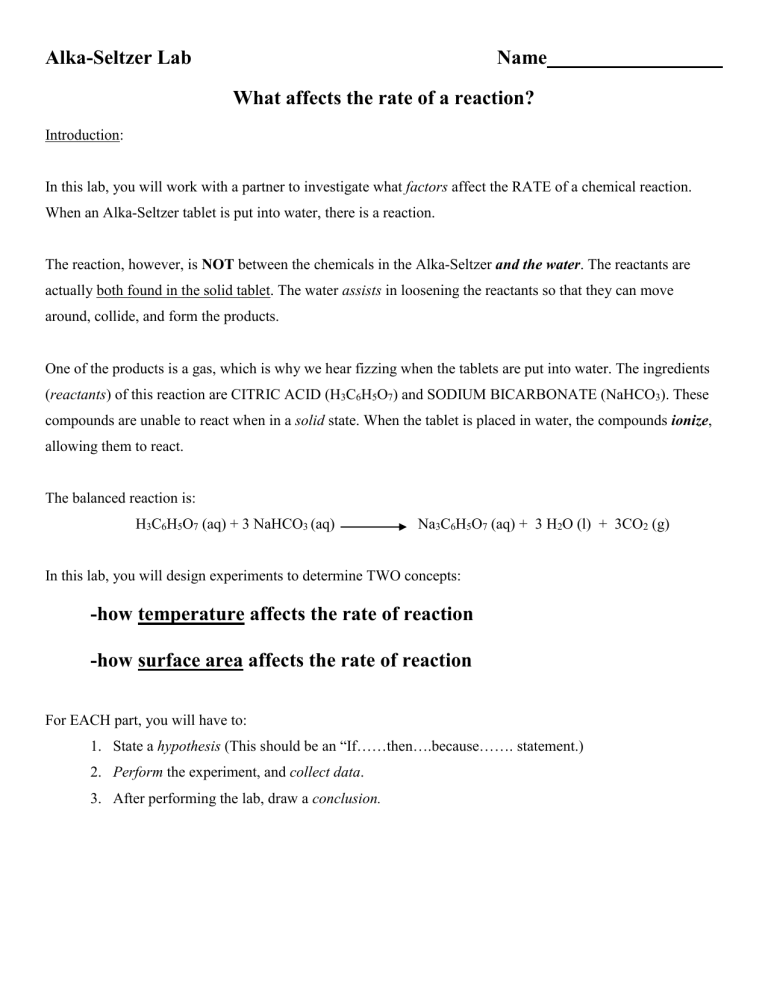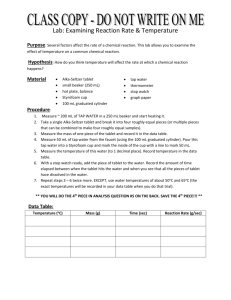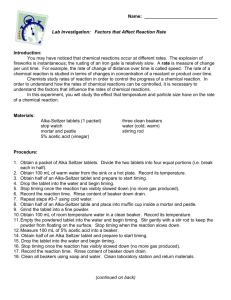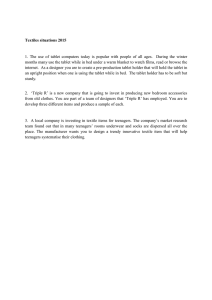Alka-Seltzer Lab: Reaction Rates & Factors
advertisement

Alka-Seltzer Lab Name What affects the rate of a reaction? Introduction: In this lab, you will work with a partner to investigate what factors affect the RATE of a chemical reaction. When an Alka-Seltzer tablet is put into water, there is a reaction. The reaction, however, is NOT between the chemicals in the Alka-Seltzer and the water. The reactants are actually both found in the solid tablet. The water assists in loosening the reactants so that they can move around, collide, and form the products. One of the products is a gas, which is why we hear fizzing when the tablets are put into water. The ingredients (reactants) of this reaction are CITRIC ACID (H3C6H5O7) and SODIUM BICARBONATE (NaHCO3). These compounds are unable to react when in a solid state. When the tablet is placed in water, the compounds ionize, allowing them to react. The balanced reaction is: H3C6H5O7 (aq) + 3 NaHCO3 (aq) Na3C6H5O7 (aq) + 3 H2O (l) + 3CO2 (g) In this lab, you will design experiments to determine TWO concepts: -how temperature affects the rate of reaction -how surface area affects the rate of reaction For EACH part, you will have to: 1. State a hypothesis (This should be an “If……then….because……. statement.) 2. Perform the experiment, and collect data. 3. After performing the lab, draw a conclusion. PART ONE: Effect of temperature on a chemical reaction. HYPOTHESIS (How will temperature affect the rate of a chemical reaction?) PROCEDURE (NUMBER YOUR STEPS) 1. Place an Alka-Seltzer tablet on a piece of paper towel. 2. Break the tablet in two with a spatula. 3. Weigh each piece using an electronic balance. Adjust the weight of one piece by breaking off fragments with the spatula so that the masses of each piece are identical. Record the mass of each piece of tablet. 4. Using a graduated cylinder, measure 50 mL of hot water into a 100 mL beaker and measure 50 mL of cold water into another 100 mL beaker. Verify the temperatures are different using an electronic thermometer. Record the temperatures of each beaker of water. 5. Simultaneously add one piece of tablet to each beaker of water. 6. Observe and note which tablet, if any, dissolves first. What is the independent variable in this experiment? _____ ___________ What is the dependent variable in this experiment? __ ________________ DATA: (SET UP A DATA TABLE – ROW/COLUMN) mass of piece of tablet/ g volume of water/ mL temperature of water/ oC time to finish dissolving/ min:s Note you only need one time column: either compare which finishes first or second, or record real times. CONCLUSION (Was your hypothesis correct? How do you know?) If you had more time, what additional procedures could you follow? Explain WHY temperature affects the rate of a chemical reaction PART TWO: Effect of surface area on a chemical reaction. HYPOTHESIS (How will surface area affect the rate of a chemical reaction?): PROCEDURE (NUMBER YOUR STEPS) 1. Place an Alka-Seltzer tablet on a piece of paper towel. 2. Break the tablet in two with a spatula. 3. Using an electronic balance, record the mass of the smaller piece of tablet. 4. Using a pestle and mortar, grind the larger piece of tablet into smaller pieces. Weigh out an equal mass of this ground piece of tablet as the piece in 3. 5. Using a graduated cylinder, measure 50 mL of water into two 100 mL beakers. The temperature of water in each beaker of water is the same and can be verified with an electronic thermometer. 6. Simultaneously add the piece of tablet from 3 and the ground tablet from 4 to each beaker of water. 7. Observe and note in which beaker, if any, the Alka-Seltzer dissolves first. What is the independent variable in this experiment? ____ _________ What is the dependent variable in this experiment? ______________ DATA: (SET UP A DATA TABLE – ROW/COLUMN) surface area of Alka-Seltzer mass of piece of tablet/ g volume of water/ mL time to finish dissolving/ min:s low - chunk high - ground Note you only need one time column: either compare which finishes first or second, or record real times. CONCLUSION (Was your hypothesis correct? How do you know?) If you had more time, what additional procedures could you follow? Explain WHY surface area affects the rate of a chemical reaction


